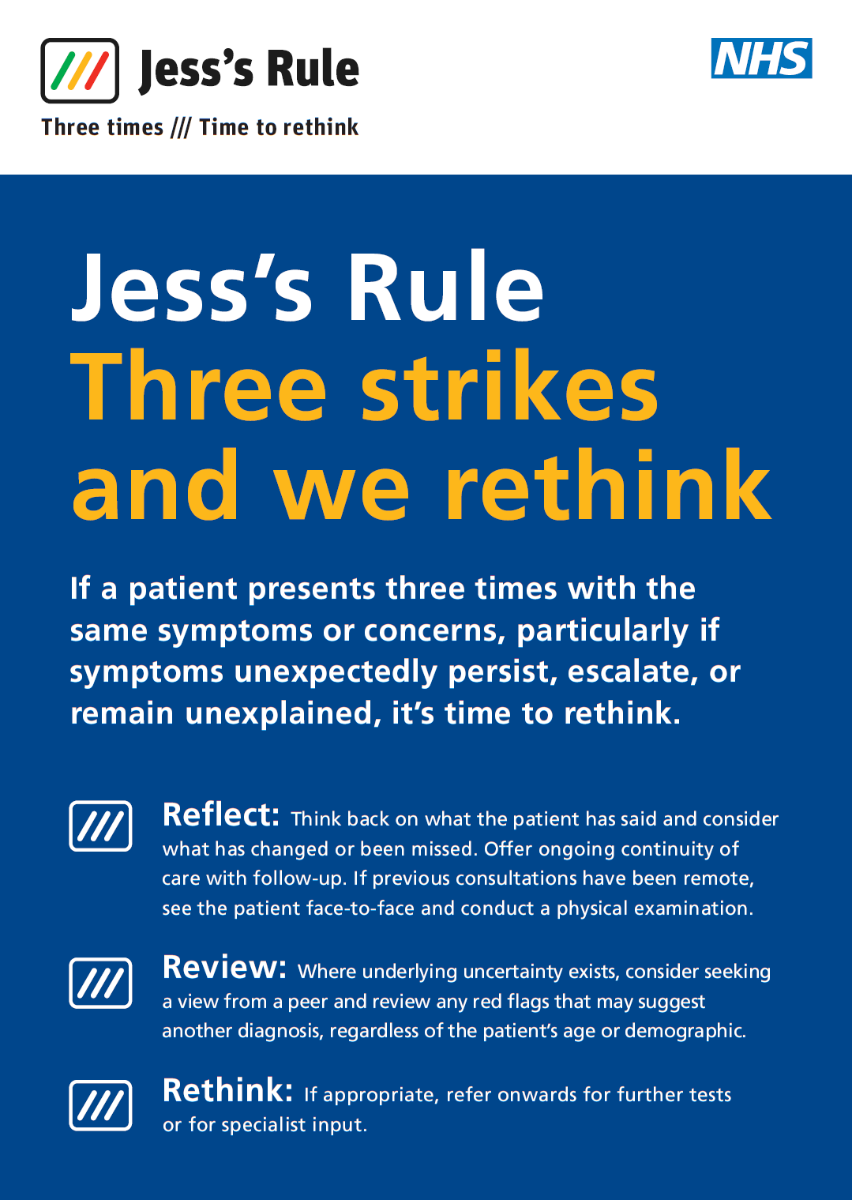The NHS has introduced a new initiative, Jess’s Rule, named in memory of Jessica Brady, who contacted her GP more than 20 times after first feeling unwell in the summer of 2020.
Jess’s Rule is born out of a tragic case that exposed gaps in how undiagnosed or worsening health concerns are handled in primary care. Jessica Brady was a 27-year-old engineer who died of late-stage cancer in 2020 after more than 20 GP appointments without a diagnosis. The initiative aims to ensure fewer people fall through the cracks when their symptoms aren’t improving.
Under this approach, GPs are encouraged to follow a “three strikes and rethink” protocol: if a patient has attended three appointments with the same or escalating symptoms, or the initial treatment plan isn’t working, the GP should pause, reflect, and consider reassessing the case. That might mean switching from virtual to in-person review, ordering more tests, getting a second opinion, or referring to a specialist.
Why Jess’s Rule is an important step in the right direction for patient care
Earlier detection of serious conditions
One of the biggest hopes is that this rule will lead to faster diagnoses of cancer and other serious illnesses, especially in patients who repeatedly present with worrying symptoms. Jess’s case tragically showed how delays can lead to irreversible outcomes.
Reducing inequalities
Research suggests that younger patients and people from ethnic minority backgrounds often face diagnostic delays. Jess’s Rule could help standardise how signs are taken seriously, no matter a patient’s age or background.
Clearer guidance for GPs
Many physicians already empathise with patients with persistent symptoms but may lack a formal structure for revisiting cases when initial approaches fail. By embedding “rethink” moments into policy, Jess’s Rule gives tools and permission to take a second look.
What challenges could arise with Jess’s Rule being rolled out across the NHS?
Jess’s Rule is a promising initiative, but several factors will determine how effective it becomes in practice:
Resource constraints
If GPs are to offer more face-to-face appointments, order more diagnostics, or refer more often, there must be sufficient capacity and funding. Without that, some patients may theoretically benefit less.
Training and awareness
GPs and primary care teams will need support in recognising when “three strikes” should trigger a rethink. Recognising symptoms that don’t follow classic patterns (for example, in younger patients) will be crucial.
Continuity of care
Jess’s Rule may work best when patients see the same GP or team, so that symptoms and their history are clearly understood. Where healthcare is fragmented, things may still be missed.
Avoiding over-referral
While vigilance is good, there’s a risk of increased referrals or test requests that may strain specialist services. Balancing careful evaluation with prudent use of resources will be a delicate act.

What needs to be done to make Jess’s Rule a success?
Jess’s Rule: Three strikes and we rethink
Jess’s Rule is more than a policy tweak; it’s a cultural shift. To make it work, stakeholders need to:
- Ensure GP practices have the infrastructure – time, diagnostics, specialist access – to act decisively when a case isn’t improving.
- Embed education around atypical symptom presentation, particularly in younger patients and underrepresented groups.
- Monitor outcomes and track whether diagnosis times improve, whether serious cases are caught earlier, and by how much patient safety is enhanced.
- Engage with patients to encourage those with symptoms that persist to speak up, feel heard, and ask for review when needed.
Theoretically, Jess’s Rule could become a landmark initiative in how primary care treats uncertainty. If implemented well by stakeholders within the NHS, it may reduce delays, save lives, and rebuild trust in the diagnostic journey.
Looking for expert support with your recruitment needs?
Compass Associates offer award-winning recruitment services with a proven track record across high-volume projects, strategic hires, team mobilisations, and sensitive transitions. Register your vacancy or read our case studies to discover how our consultants can support your success.
Looking for your next role within Healthcare?
You can check out all the current vacancies we have available via our jobs page.
